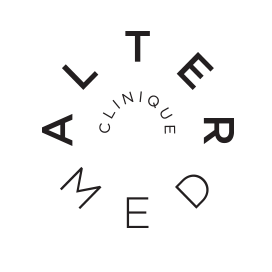Clinique Altermed
It seems like a day doesn’t go by without hearing or reading something about the “war on obesity” to improve our collective and individual health. But should ending the war on fat really be a priority?
Ending the war on fat
This is thoroughly frustrating for a few reasons. Firstly, it assumes that certain body sizes are bad/unhealthy/need to be fought. Secondly, it assumes that once “obesity” is taken care of, people would be more healthy.
Mounting research shows that body size and weight are in no way indicators of health and losing weight does not automatically improve health.
The messages we use to “encourage” or “help” people improve their health (which, let’s not forget, includes both mental and physical health) are extremely important to avoid doing more harm than good. Our past attempts (ie. focusing on weight loss for improved health) not only have NOT worked but they have led to more unhealthiness. This suggests we need to take a different approach to improving health.
Rather than one based in fear of fatness, repetition of the same old healthy eating messages (“eat your veggies”) and declarations that healthy lifestyles are easy, perhaps changing our tune could be more helpful and lead to better mental and physical health. Fortunately, there is an alternative approach. It is called the Health at Every Size® approach.
“Body positivity is just a sneaky way to encourage obesity.”
I’ve heard this opinion so many times, and it’s straight up wrong—and science agrees. The way we think about our bodies plays a huge role in the way we take care of ourselves, and obsessing over food and weight does more harm than good. Linda Bacon, Ph.D., a researcher, author, and advocate of Health at Every Size®, makes an interesting point: maybe “the epidemic is NOT obesity, [and] the real crisis lies in the toxic stigma placed on certain bodies.”
Being body positive doesn’t mean that you’ve “given up,” or that you’re “letting yourself go.” As famously said by body-positive writer Lindy West, “you can’t take good care of a thing you hate.” Embracing our bodies rather than fighting them is the first step towards proper self-care, such as in nourishing our bodies, listening to our hunger and satiety cues, and enjoying all foods without stress or guilt. This is where Health at Every Size® (HAES) comes in, a non-diet and weight-neutral approach to health that anyone can benefit from.
What is HAES®?
The Health at Every Size® (HAES) movement encourages people to adopt a healthy lifestyle for the sole purpose of being healthy, rather than weight loss. This non-diet, weight-neutral approach means that all body shapes and sizes are encouraged to embrace their bodies, eat and exercise in a way that makes them feel good, without the stress, guilt, or judgment associated with weight stigma and dieting. Body acceptance doesn’t promote obesity—it helps people of all sizes adopt healthy habits for the right reasons, and a “healthy weight” will be different from person to person.
But isn’t it unhealthy to be overweight?
Weight and health are two separate things, and one does not determine the other. Just as “looking fit” does not always reflect being metabolically healthy, excess body fat does not necessarily signify poor health, either. In fact, being classified as “overweight” is not even linked to higher death rates, according to the latest research in the Journal of the American Medical Association. Lifestyle factors such as exercise, sleep, stress levels, and eating a balanced, nourishing diet are much better predictors of internal health than weight alone.
Since people of any size—big or small—can be sedentary or eat unhealthy diets, more and more studies are showing that we “should focus on physical activity and fitness-based interventions rather than weight-loss driven approaches to reduce mortality risk.”
How can HAES® help?
Numerous studies show that using a HAES® approach is linked to improvements in blood lipids, dietary quality, physical activity, and overall self-esteem. A weight-neutral approach to health is not only more sustainable over the long run, but also much healthier than dieting, which only leads to temporary weight loss and is associated with increased mortality risk, as well as increased chronic stress and cortisol levels. A recent Canadian study in the Clinical Nutrition Journal has confirmed that on top of improving diet quality, a HAES® intervention has been shown to improve intuitive eating, also known as mindful eating, which involves listening to the body’s natural hunger and satiety cues and establishing a healthy relationship with eating and the body.
We are taught to hate body fat and to prioritize weight loss over health, but we should really be doing the opposite—promoting health regardless of weight and accepting all bodies.


